
36 minute read
8 16
“We need to make our port a bigger dot on the map”, says Johan De Raeve, Promotion Council North Sea Port Board Member.
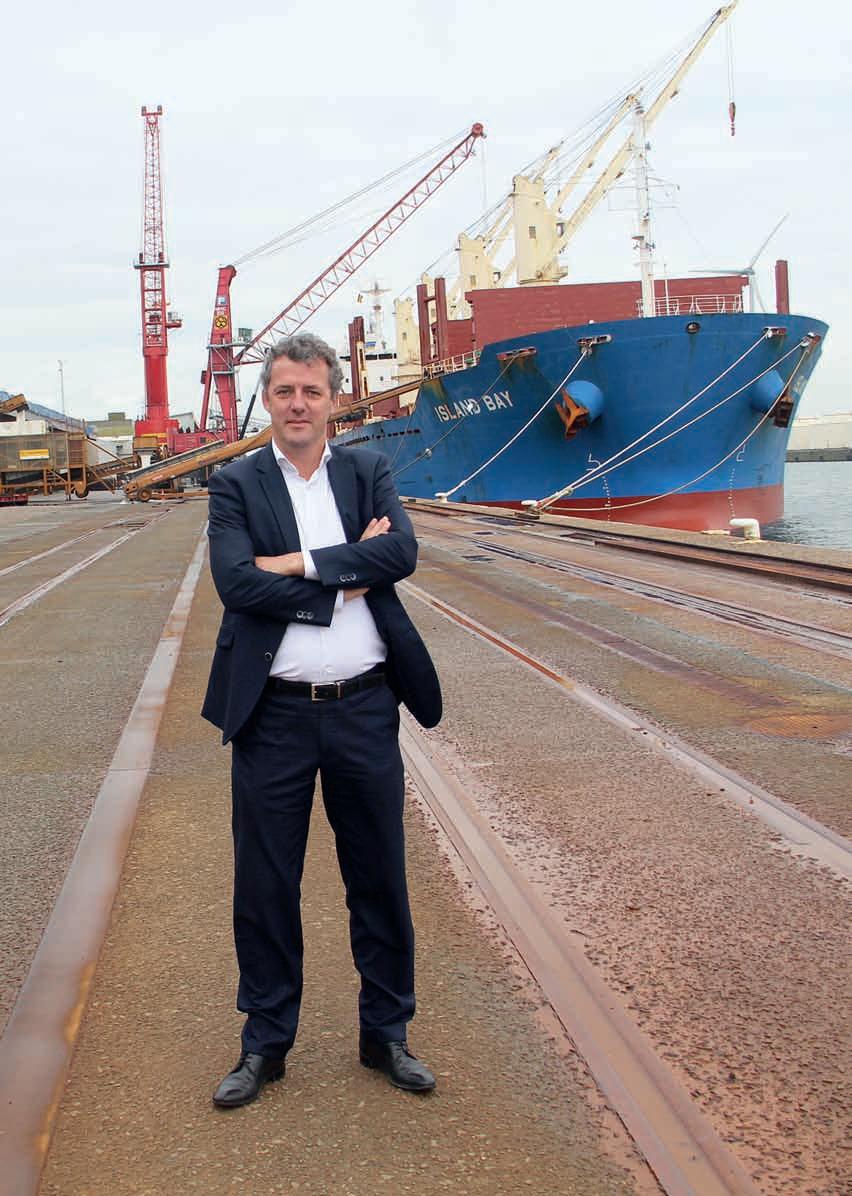
Johan De Raeve joins board of Promotion Council
Promotion Council North Sea Port broadens its base once more as Johan De Raeve joins the council board, adding a strong voice from the Belgian side of the cross-border seaport to the organisation. The managing director of stevedoring company Stukwerkers brings with him seven centuries of port history, as well as some of his own family souvenirs.
Q: Growing up in a family that runs a company like Stukwerkers must mean the port was never far away in your youth. At what age did you make your fi rst steps on the quay? And what is your oldest recollection? A: When I was a little boy, my father still used to work every Saturday. From time to time I was allowed to join him to the port on that day, especially when there was a lot of activity on the quays. It was always a very special experience. I remember very well – I was a twelve year old kid – the day we took into service the toboggans to load bagged goods into the hold of deepsea ships. To step on a machine of this size when it is in full operation made a big impression. Driving into a big RoRo carrier delivering Honda cars in Ghent is another thrilling moment that I recall. And when our technical division moved from New York Street to Farman Street, the old sheds became the ground for many treasure hunts.
Q: Did you ever consider doing anything else than getting into the port business? A: When I got out of high school, where I was in a LatinMathematics class, obtaining a university degree was the thing that I was expected to do. I tried economics in my fi rst year, but then switched to law studies, thus keeping all options open for the future. Even then, I continued with student jobs within the company and became more familiar with port operations and with the dock labourers performing these tasks.
Q: How would you describe the evolution that the port business has gone through since you started? A: Every port or port company has its own story, but I guess North Sea Port and the surrounding ports underwent a pretty similar evolution. The biggest changes happened when my grandfather was the dean of our company. Those were the days when horses and carriages where replaced by lift trucks. It set off a transformation that continued when my father was CEO. Cranes and machines became ever bigger and more powerful. The pace of this transformation somewhat slowed in the twenty years since I became active at Stukwerkers in 1999. The main difference would be that the volume of conventional cargo shrank dramatically, whereas the container trade boomed as never before.
Q: Your company is one of the main actors in stevedoring in the Belgian part of North Sea Port, and one that is active in many different fi elds and fl ows on different terminals. Could you give us an overview? A: Stukwerkers Group can offer a complete set of services. De Baerdemaecker can take care of ship agency, forwarding, and customs clearance. Stukwerkers can handle and store conventional cargo, breakbulk, dry bulk, project cargo, and containers (offering stripping and stuffi ng for added value). Globally speaking, we load or unload about three million tonnes of maritime cargo each year. Breakbulk or conventional cargo make up about 2,25t million (with steel products accounting for 75% of that volume, the complement existing of sawn timber, paper and pulp, cars, high & heavies, and so on). Next to that, we also handle half a million tonnes of dry bulk (such as fertilisers, woodchips, salt) and a quarter million tonnes of containerised goods. A major trump card is that all our terminals are trimodal, being connected to road, rail, and water. The fl ows related to inland navigation, which are quite important, are not comprised in the numbers stated above.
Q: You have to regularly invest to stay on top of your business. What are the most recent developments in this fi eld? A: We are a highly capital-intensive service provider and continuously invest in our terminals, installations, and equipment. Just a few months ago we received the last two of three mobile harbour cranes that we ordered, both of which have a lifting capacity of 144t. We also bought several lift trucks which are able to lift up to 45t. We opened a brand-new state-of-the-art deep-freeze warehouse at the Sifferdok in June.
“WITHIN NORTH SEA PORT WE STILL HAVE STRONG FLEMISH AND DUTCH PLAYERS ON THE PITCH.”
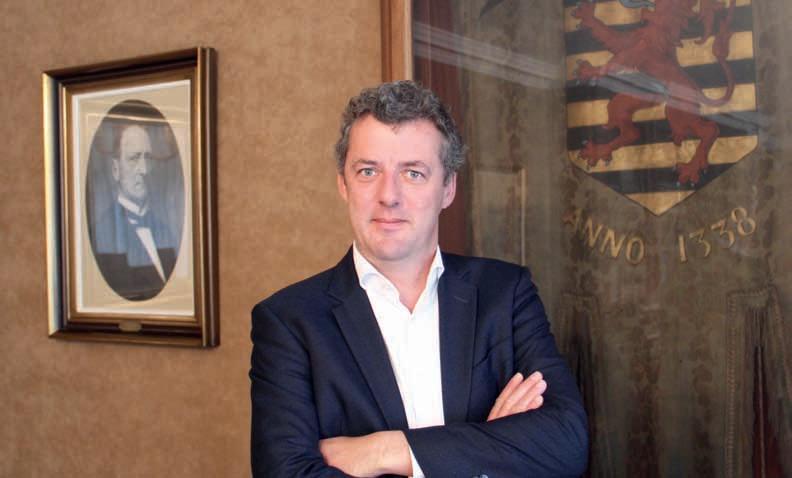
Q: Stukwerkers is still a family business, of which it is rightfully proud. How easy is it for companies like yours to stand their ground in a fi eld where multinationals have a big say? A: At the end of the day, most companies – even multinational ones – are family businesses. But it is regrettable that a lot of Flemish knowhow and concessions have been taken over by foreign entities. Luckily, within North Sea Port and in the surrounding ports we still have a number of Flemish and Dutch players on the pitch. I believe and hope this will remain this way. The fact that decisions can be taken more rapidly, the owner of the company can – if need be – play his part on the work fl oor, and that he knows the language and habits of the port labourers, is an advantage. It guarantees that companies like ours still have a future, together with our existing market position and the fact that we never cease to look for operational improvements and new trades to serve.
Q: How does a company with a history stretching back to the 14th century envision its future? A: We have come so far by keeping our feet on the ground and diversifying and continuing to develop our business. That is what we will continue to do. Of course, we have been through diffi cult times in the past and the present COVID-19 crisis or Brexit turmoil constitute new challenges that we must deal with. But together with our clients, we will overcome these perils. The company is growing at a regular pace – external capital could perhaps have hastened this process, of course – and we aim at long-lasting relationships with our clients, supporting them in their own investments and growth.
Q: How does North Sea Port as a cross-border entity fi t into your plans? A: The merger between Vlissingen/Terneuzen and Ghent was a logical step to take. On the one hand it will offer us more
commercial possibilities and opportunities, and on the other hand it can lead to synergies that make North Sea Port as a whole more competitive with regard to surrounding ports.
Q: Looking back at the merger between Zeeland Seaports and Ghent, how is North Sea Port doing in your view? A: In my view, the COVID-19 pandemic has had a heavy impact on North Sea Port. I am convinced we would have taken greater steps forward without this sanitary crisis. Commercially speaking, a lot of things have now come to a standstill. But we also see ample positive developments such as the lock planning. There is still a lot to be done, even if not everything fi ts the same mold.
Q: You now take a seat as board member in the Promotion Council North Sea Port. Is North Sea Port already a familiar item for your customers? A: We need to make our port a bigger dot on the map and in the mind. A lot has already been done to make North Sea Port a brand name that sticks, but this is of course a process that takes some time, even within the port itself and with the private port operators. A shared stand at a trade fair only makes sense if the Dutch and Flemish participants do not stick to their own corner. But I am confi dent that we are moving in the right direction, and things will turn out just fi ne.
EURO-MIT STAAL B.V. EURO-MIT STAAL B.V. STEEL SERVICE CENTER STEEL SERVICE CENTER
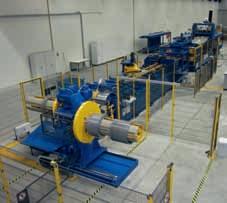
EMS is specialized in slitting the higher grades of electrical steel for the transformer P.O. Box 535, industry. Wide coils of thin gauge plate material is slit down to smaller coils, both 4380 AM Vlissingen, The Netherlands widthways and lengthways. EMS is also able to cut these coils into so called Location Duitslandweg 7, laminations of customer-specific lengths and shapes, fitting the requirements of the transformer manufacturers. Haven 1153, Vlissingen-oost Phone: +31 (0)118 422500 P.O. Box 535, 4380 AM Vlissingen, The Netherlands Email: info@euro-mit-staal.com Website: www.euro-mit-staal.com Location: Duitslandweg 7, Haven 1153, Vlissingen-oost Phone: +31 (0)118 422500 Email: info@euro-mit-staal.com Website: www.euro-mit-staal.com
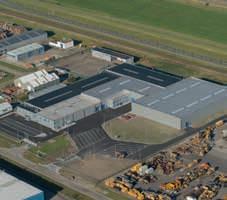
Euro Mit Staal 2020.indd 1


Damen Shiprepair Vlissingen

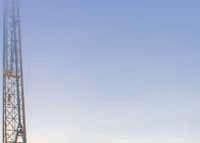
EURO-MIT STAAL B.V.

22-01-20 16:16
Our yard offers the full range of services a ship owner might require, from normal dry dockings for scheduled maintenance to damage repair or extensive refit and conversion jobs.

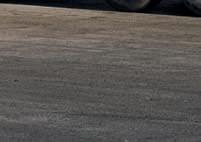
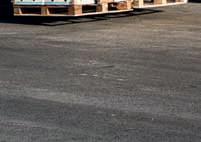
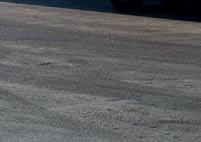
Expanding export

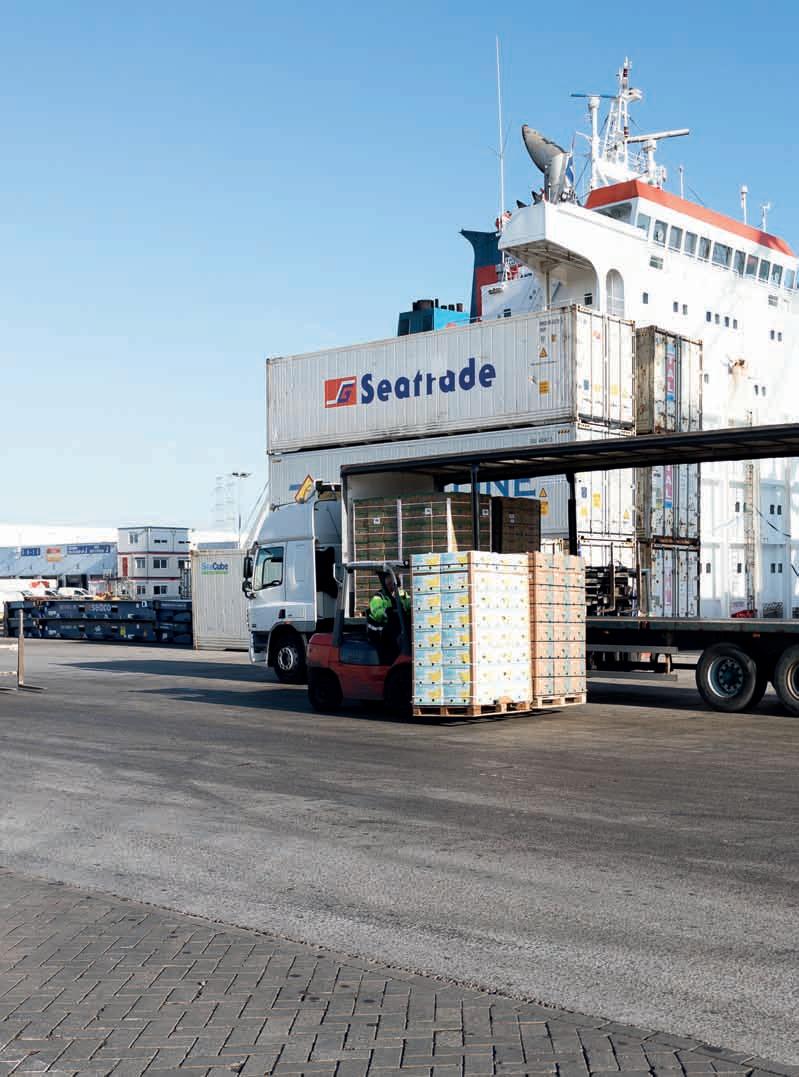
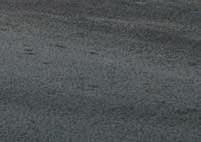

with excellent facilities for the handling and storage of goods of all kinds, north Sea port plays an essential role in the supply chain of many goods, both for import and export. it has grown into one of the leading ports for fresh products and europe’s number one port for the import of bananas.

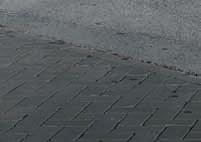




goodS can be directly Shipped from europe, thankS to ZZcoldStore’S location cloSe to the north Sea. ZZcoldStore inVeSted in additional temperature-controlled warehouSe facilitieS and now haS Storage Space for 13,000 palletS.
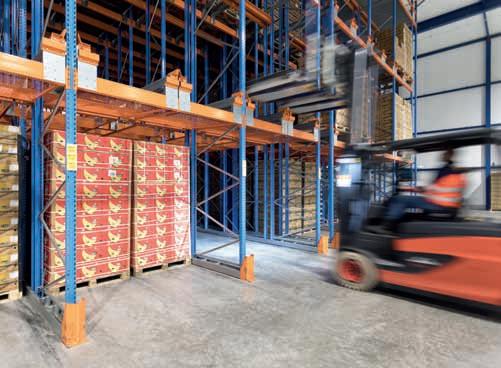


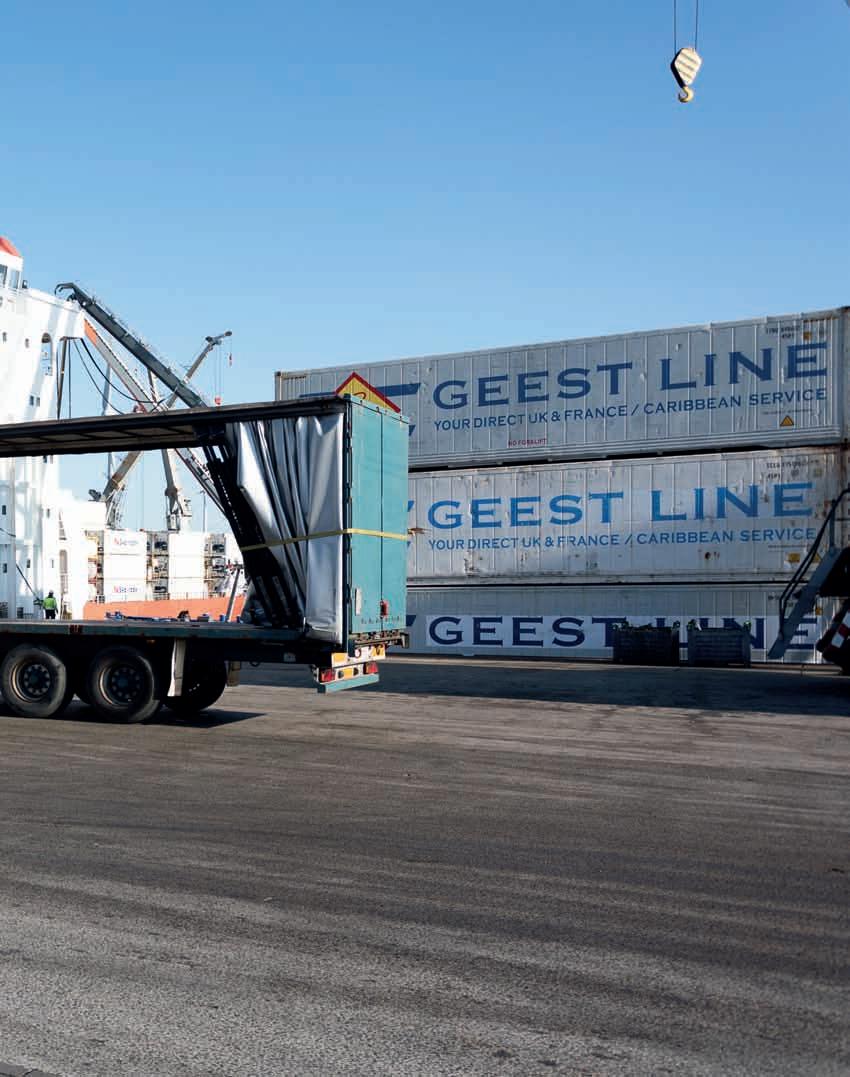
eVery week, tonneS of freSh productS, mainly Shipped by Seatrade, arriVe from central america, South america, and the caribbean at thiS terminal in the bijleVeldhaVen.
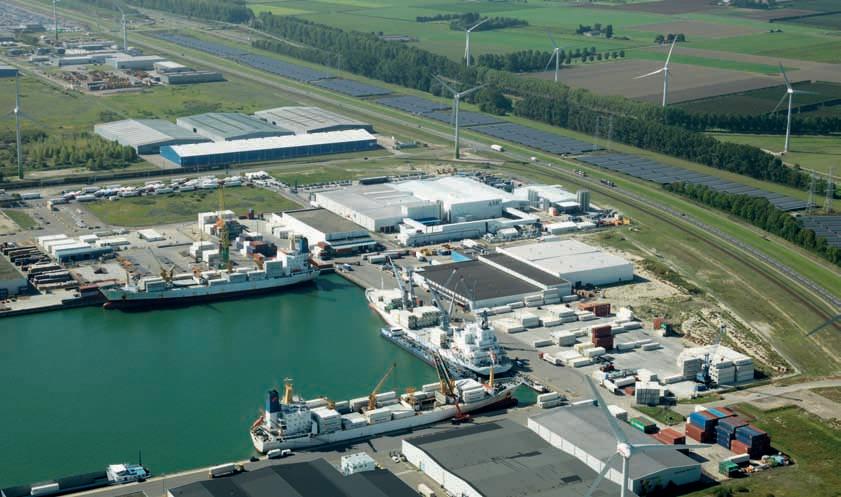
Photo courtesy of Sky Pictures.
One of the dedicated terminal operators dealing with bananas and other types of fruit and vegetables is ZZColdstore. Every week, tonnes of fresh products, mainly shipped by Seatrade and Geest Line, arrive from Central America, South America, and the Caribbean at the terminal in the Bijleveldhaven. “For Seatrade and Geest Line, Vlissingen is an important hub”, Menno van Gorcum, Director of Seatrade Rotterdam, says. “For our vulnerable fresh cargo,” Mr Van Gorcum continues, “efficient operation at the terminal is necessary, for which we can rely on ZZColdstore as partner. We have around 175 calls per year at Vlissingen with three arrivals per week, of which a substantial volume is handled at ZZColdstore’s terminal. Seatrade Rotterdam is officially appointed as general agent Benelux by Geest Line UK as per 1 January 2021.”
Investments In the past few years, ZZColdstore has been investing in its terminal in order to further improve the services it can offer. “Based on the Seatrade service,” comments Sam Don, Managing Logistics of ZZColdstore, “we decided to expand our storage facilities for the reefer containers, build an additional temperature-controlled warehouse, and expand with an extra 1.4ha of open area for the storage of backhaul cargo. We currently have plugs for 480 reefer containers and we can now store 13,000 pallets in our warehouses, which equals approximately three fully loaded Seatrade vessels. We have also invested in two new reach-stackers and two mobile cranes: a crane for unloading the barges that take the export and import containers to and from Vlissingen and a Gottwald 7 for loading and unloading seagoing vessels. Containers are not only stored at our terminal, but also stripped and stuffed. We hence integrate both shipping and logistic operations at our terminal.”
Photo courtesy of Scherp! Fotografie
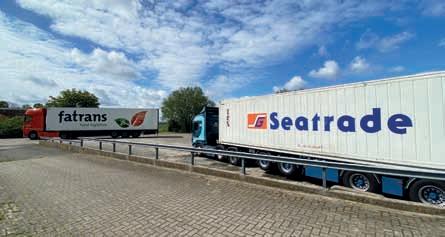
SponSored containerS with goodS for curaçao on their way to VliSSingen.
Food Banks The corona virus has a great impact on daily life at the final destination of Seatrade’s liner services. The virus has an increasing effect on poverty, which is why the company decided to support the supply of seven containers filled with daily essentials and other goods for the food banks in Curaçao. “With regard to COVID-19,” Mr Van Gorcum says, “we are glad to notice that our import operation is less effected by the virus. European consumers still need fresh products. On the other hand, for some of our export regions the virus has a lot of impact, for example because of the high dependency on tourism and the cruise sector. This is why we decided, together with Fatrans, Paddy Romer Bureau, Patani Food Group, Cavalier Logistics, and ZZColdstore, to support the supply of seven containers filled with foodstuffs for the Curaçao food banks. This is of course merely a small gesture, but it underlines our strong bond with our destinations.”
Guatemala
Nicaragua
Costa Rica Aruba Bonaire Curacao
Dominica
St. Lucia Martinique

St. Vincent
Grenada Barbados
ROTTERDAM B.V .
PORT AGENTS AND LOGISTIC SERVICES Colombia Surinam
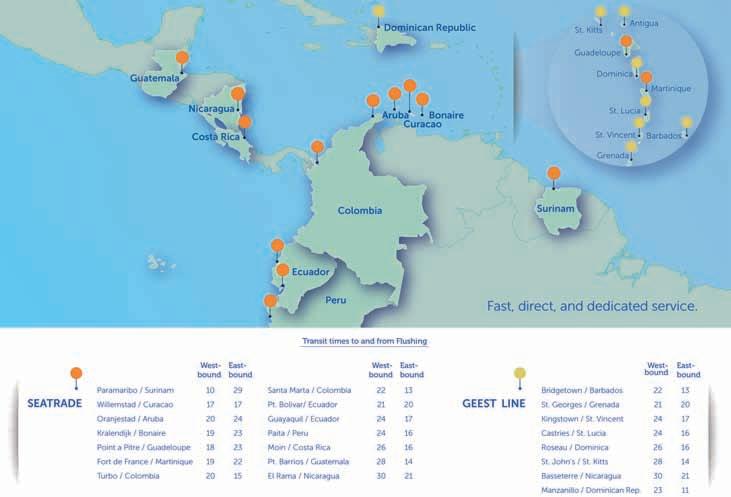
Ecuador
Peru Fast, direct, and dedicated service.
SEATRADE
Westbound
Eastbound Paramaribo / Surinam 10 29 Willemstad / Curacao 17 17 Oranjestad / Aruba 20 24
Kralendijk / Bonaire
19 23 Point a Pitre / Guadeloupe 18 23 Fort de France / Martinique 19 22 Turbo / Colombia 20 15 Transit times to and from Flushing Transit times to and from Vlissingen
Westbound
Eastbound Santa Marta / Colombia 22 13 Pt. Bolivar/ Ecuador 21 20 Guayaquil / Ecuador 24 17
Paita / Peru 24 16
Moin / Costa Rica
26 16 Pt. Barrios / Guatemala 28 14 El Rama / Nicaragua 30 21 GEEST LINE
Westbound
Eastbound Bridgetown / Barbados 22 13 St. Georges / Grenada 21 20 Kingstown / St. Vincent 24 17
Castries / St. Lucia 24 16
Roseau / Dominica 26 16
St. John’s / St. Kitts 28
14 Basseterre / Nicaragua 30 21 Manzanillo / Dominican Rep. 23 11
175 callS per year at VliSSingen with three arriValS per week, of which a SubStantial Volume iS handled at ZZcoldStore’S terminal.
Complex process Next to new hardware, ZZColdstore furthermore invested in optimising its IT facilities. Mr Don explains, “At our terminal, we store and handle around 150 different types of bananas that are transported to the market every day. To ensure the right bananas are shipped on time and to the right destination, we are digitally connected to the retailers ordering systems. The computer of a supermarket, for example, sends the order for bananas to the retailer’s headquarters. The headquarters’ computer sends the total demand for bananas for all its supermarkets to the ripener, which in turn informs us which bananas we need to prepare for transport. This is a continuous and complex process that demands a lot from our organisation, and this is why we constantly keep our IT systems up to date. A special digital app was recently developed to optimise our communication with the front end of the supply chain. With this app, the vessels can preannounce their arrival. We can thus further streamline the terminal operation, which ultimately leads to shorter waiting times for customers and trucking companies, and faster departure of vessels from our terminals.” “Our aim is to have the goods, both pallets and containers, stored at the terminal as short as possible”, Mr Van Gorcum adds. “The new improved IT solution highly reduces the lead times of the entire process, which is important for our imported products but of course also for the products we export such as potatoes, meat, foodstuffs, and diaries.”
Back haul Backhaul cargo is important for economically optimising the weekly service. Or in Mr Don’s words, “Seatrade’s and Geest Line’s vessels return to the other side of the Atlantic Ocean every week to collect new fresh products, and the operation will be significantly optimised from an economical point of view, when the returning vessels have sufficient export cargo on board. In Vlissingen, we are able to take care of a broad range of cargo, both conditioned and unconditioned, in (reefer) containers, palletised, and as RoRo cargo, which can be directly shipped from Europe.” Mr Van Gorcum adds, “Our export and import activities are fully complementary to each other. Based on the optimised balance of both volumes, in combination with the flexibility and speed provided with our own specialised reefers and container vessels, we can outstand and compete with the global container carriers as these carriers usually offer transhipment services with longer transit times, instead of direct lines. So it takes more time for them to arrive at their final destination. Compared with the global container carriers, we have the advantage that we are not restricted to just carrying containers and can ship almost all types of goods to our final destinations. With its excellent, congestion-free and multimodal hinterland connections, North Sea Port is a perfect hub for supplying all sorts of consumer goods, including temperaturecontrolled products, from Belgium, the North of France, Germany, and the Netherlands.”
Streamlined and aligned operation “Our motto is Fast, Direct and Dedicated”, Mr Van Gorcum voices. “We work with our own vessels, own offices, and strategic partners that exclusively work for us on both sides of the Atlantic. We are hence able to streamline and align the operational processes and to continuously improve our service. Our service might on average seem a bit more expensive compared with global container carriers but thanks to our
Photo courtesy of Scherp! Fotografie.

bananaS are loaded for tranSport. the banana logiSticS iS a continuouS and complex proceSS that demandS a lot from the organiSation. speed, European supermarkets receive the vulnerable fresh products much quicker, resulting in less waste caused by fruit that cannot be sold anymore. This ultimately saves money for everyone. The same obviously also applies to the backhaul, in terms of supermarkets supplies and for building projects.”
Satisfied customers With the Netherlands as production region of a broad range of products, ZZColdstore has a backyard with lots of goods that are essential for the Caribbean. “The Caribbean highly depend on the import of goods to fulfil the inhabitants’ daily needs,” Mr Van Gorcum explains, “and with our streamlined operation, we can realise a high speed and efficient service and port operation that results in a swift supply of the Caribbean isles and other destinations. Via our weekly service, we ship goods to a wide range of destinations such as Curaçao, Bonaire and Aruba, Costa Rica, Colombia, Ecuador, Guatemala, Honduras, Nicaragua, Peru, Lee & Windward Islands, and Surinam. Together with ZZColdstore we are now working on expanding the export volumes to further optimise the back haul services. It is good to notice that since the start of the service from Vlissingen, our customers have been very satisfied with the way things are handled in Vlissingen, resulting in an increase of carried backhaul cargo. As we operate in a small world where we all know each other, this will no doubt lead to more parties interested in doing business with us.”
i. zzcoldstores.com i. seatrade.com
from left to right: Sam don, manager logiSticS of ZZcoldStore, robin janSen, and menno Van gorcum, director of Seatrade rotterdam at the ZZcoldStore terminal.

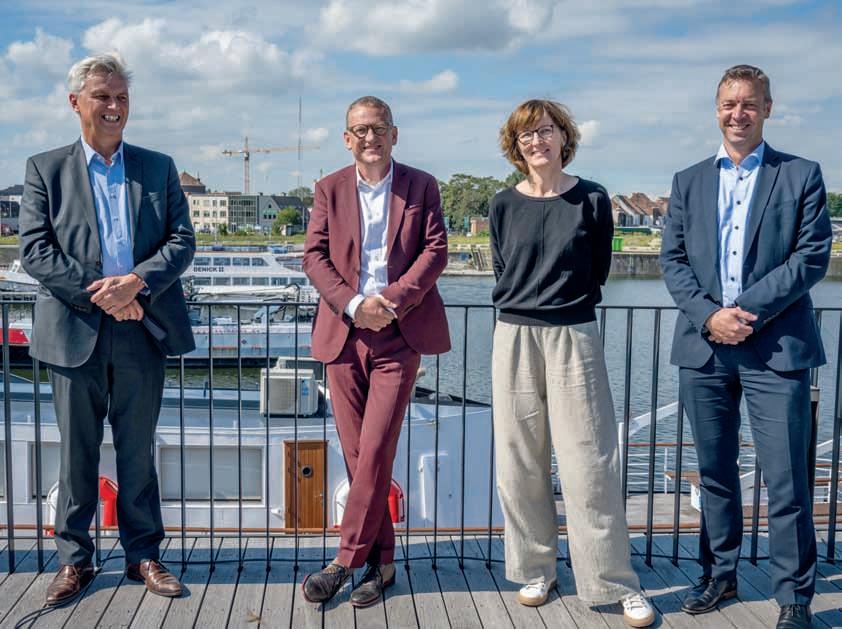
North Sea Port’s new management board teams up for the future
As of 1 September 2020, North Sea Port appointed a new management board. With the new, four-headed board, the port authority enters a new stage of its still young existence. In this article we will learn more about the new members.
At the start of North Sea Port in 2018, the management board consisted of CEO Jan Lagasse and CEO Daan Schalck. Early 2020, when Mr Lagasse announced that he was going to leave North Sea Port by the end of Augustus, the process for creating a new Management Board commenced.
Simplified management structure “Immediately after Mr Lagasse’s announcement in January to retire from his position as CEO as from 1 September 2020, our supervisory board started a process to arrange his succession”, Mr Schalck explains. “After the merger,” he continues, “we found out that, being a cross border organisation, we had to deal with many difficult decisions in a quite complex environment, simply because we had to deal with both Belgian
and Dutch rules, regulations, and stakeholders. Also, within the organisation, we had to undouble a lot of processes in order to raise our effi ciency and effectiveness. To increase decisiveness, create more commitment, and realise an improved decision process, we simplifi ed our management structure. It is within this framework that we decreased the number of managers from ten to four and increased our management board from two to four members. From the start of the merger, a promise was made to staff members that there would be development opportunities within the merged company. Consequently, the search for suitable candidates was conducted internally.”
Balanced, coherent, and complementing One of the main challenges for the supervisory board and Mr Schalck was to form a balanced, coherent, and “I think that we are all aiming for the same results, but each with his or her own strengths. So we really are complementary to one another.” Sofi e Monteyne Chief Financial Offi cer Ms Monteyne started her career at the Port of Ghent Authority in 2009 as Head of the Commercial Department. In 2013 she became Chief Financial Offi cer. “At the Commercial Department,” comments Ms Monteyne, “I was involved in the fi nancial and legal aspects of the commercial contracts, and it was my responsibility to structure the commercial operation and various other running projects that were often rather complicated and time-consuming. It was effective to have someone keeping everything well organised. In 2013, I was appointed Chief Financial Offi cer and switched to the Financial Department. After the merger in 2018, we had to reconsider all existing management roles, and I became responsible for complementing team based on individual skills, experience, and personal characteristics that, according to Mr Schalck, ultimately resulted in the appointment of three individuals that have all made their mark within the organisation. “Part of the selection process was an assessment. This assessment not only assessed the individual, but also looked at the entire team to see if it could successfully operate as one. With the new board, we have a team consisting of experienced and dedicated members that will be able to motivate each other, yet also slow one other down”, Mr Schalck says. Today, Mr Schalck acts as the organisation’s mouthpiece in almost every situation, although according to him, this will change soon. “We are currently working on a new masterplan for the upcoming years, and as I am perhaps not the person that should know everything, it is more than logical for my Management Board colleagues to step forward and act as spokesmen for those issues that they are responsible for.” Next to Mr Schalck, who will continue to operate as Chief Executive Offi cer, the three newly appointed board members are Sofi e Monteyne as Chief Financial Offi cer, Peter Van Parys as Chief Operating Offi cer, and Dick Engelhardt as Chief Development & Nautical Operations Offi cer. “All three new board members have vast experience at North Sea Port and her predecessors Port of Ghent and Zeeland Seaports. I am really looking forward to collaborating with them to help
our organisation and the port get ready for the future.” HR and Legal Affairs & Procurement.” She is really looking forward to her new role. “I really enjoy working together with my colleagues in the new management board. With the current COVID-19 crisis, it is diffi cult to meet each other face to face. This is a pity, but with modern technologies we are now virtually meeting each other regularly. I think that we are all aiming for the same results, but each with his or her own strengths. So we really are complementary to one another.” She gives an example, “Suppose the commercial department is dealing with a company that wants to lease a piece of land to start business in our port. It is my department’s responsibility to think along with the commercial team to come up with a profi table business case that is both satisfactory for us and the customer.” Ms Monteyne smiles and continues, “Indeed, this at times means that I have to slow down the enthusiasm of Mr Schalck and his team.” When looking at North Sea Port’s own organisation, one of her challenges lies in labour rules and regulations. “No matter how,” she explains, “we still have to deal with a staff that operates partly under Belgian and partly under Dutch law. This surely is a challenge, as of course we are aiming towards the entire team working on equal grounds, which is sometimes easier said than done. In this respect, we are a oneof-a-kind, meaning that it is all a matter of pioneering to fi nd the right solutions. On the other hand, it is nice to know that as one of the fi rst cross border entities in Europe, we can proudly be a fi ne example for others. One of my personal goals is to help our organisation to remain futureproof and contribute to the targets that we are going to set for the port authority to make North Sea Port a healthy port in many respects.”
Peter van Parys Chief Operational Offi cer Just like Ms Monteyne, Mr Van Parys joined Port of Ghent in 2009. “In 2009, just one month after Mr Schalck, I started my career at the port authority as Head of the Technical Department”, Mr Van Parys refl ects. “In this role I was, among other things, dealing with the realisation, management, and maintenance of the port infrastructure. It is nice to mention that in the years before the merger with Zeeland Seaports, I was meeting my colleagues of other Belgian and Dutch seaports regularly. And so I often worked together with my new management board colleague, Dick Engelhardt. As a matter of fact, I think that working together as port authorities in several projects has positively contributed to the merger process.” “Our staff include a fi ne mixture of older, experienced people, and young and talented newcomers entering the port authority without any bias. This is very motivating and stimulating for all of us.” Dick Engelhardt Chief Development & Nautical Operations Offi cer Mr Engelhardt can be seen as the promotor of innovation of the new management board. He began his career at Zeeland Seaports in 2005 as Manager Infrastructure & Environment. In 2018, after the North Sea Port merger, he was appointed Manager Development, Innovation and Projects. In his role of Chief Development & Nautical Operations Offi cer, he will contribute to the future development of North Sea Port. “Our point of view will be more strategically, and less operational”, Mr Engelhardt says. “One of the board’s roles will be to act as the face of the Port Authority towards our stakeholders, and our credo will be: ‘Don’t Tell, But Ask’. Today, we are working towards a transition from what we are now into the port of After the merger in 2018, Mr Van Parys was appointed Head of Infrastructure, which entailed Asset Management, IT, and Facility Management. As Chief Operational Offi cer, this now translates into to Infra Projects, Asset Management, Facility Management, and IT. Looking at the new Management Board, he expresses the right mix of characters. “Within our team we have a healthy mix of long-term vision, courage, conciseness, and rationality. This is how we keep ourselves focussed on our goals. And it is good to see that we get along well.” For the near future, a number of important infrastructural improvements will keep Mr Van Parys and his department busy. “As soon as the new lock near Terneuzen will be opened, this will contribute to extra traffi c to our port with larger vessels. In fact, the new lock highly contributes to our license to operate, as only the improvement of infrastructure in and around our port will help us keep up with international multimodal developments. The next step will be to investigate the possibilities of local widening and deepening of the Ghent-Terneuzen Canal. Only then will we fully profi t from the new lock’s capacity. Another point of interest is rail. One of our spearheads in this matter is the Axel-Zelzate rail connection on the east side of the Ghent-Terneuzen Canal. With this new railroad, a complete circle of rail, accessible from all directions and connected directly to the hinterland, will be established around Ghent and Terneuzen in the North Sea Port area. Finally, the redevelopment of existing plots in our port will be on our to-do list. Terrains like the former Thermphos factory
will give us ample opportunities for further growth.” the future. Our ecosystem is formed by industry, logistics, and environment. In order to make the right decisions for reaching our goals, it is important to consult our stakeholders and ask their opinion on these three subjects.” One of the spearheads for Mr Engelhardt will be innovation. “We should all keep in mind that innovation is merely an instrument, and not a goal”, he voices. “Nevertheless, being innovative will help us to fi nd the best solutions for the energy transition, digitalisation, and circularity that are all necessary for the port’s future. We certainly do not do all of this ourselves, but with the help of everyone in our port community. Our role will mainly be that of facilitator and director.” For Mr Engelhardt, it is clear that innovation and sustainability go hand in hand and looking at this, a lot has already been achieved at North Sea Port. “In our port, around 400MW of renewable energy is produced by means of solar and wind power, and the reduction of CO2 has been high on our agenda for quite some time now. The port community is at present taking important steps in the fi eld of green hydrogen and the use of water in the production process and its possible negative effects on the environment.” Looking at North Sea Port’s organisation, he notices a very encouraging development. “Today at North Sea Port, we are working together with an interesting mix of Dutch and Flemish cultures. We learn a lot from each other. It is also good to see that our staff include a fi ne mixture of older, experienced people, and young and talented newcomers entering the port authority without any bias. This is very motivating and stimulating for all of us.”
Alco Bio Fuel
Looking for further greening and diversification

Photo courtesy of Alco Bio Fuel.
Alco Bio Fuel is taking a new step in greening its operations by building a second unit for the recycling of CO2 generated by the production of bio-ethanol. “Other developments will follow. Sustainability is our core business and we are constantly looking at further diversifying our products portfolio, in line with the many possibilities offered by our biorefinery”, says Plant Manager Pablo Vercruysse.
ALco Bio FueL And Green co2 (with the storAGe unit in the Lower riGht corner) Are An inteGrAL pArt oF the rodenhuize BiocLuster And interAct with the euro-siLo GrAin terminAL And oiLtAnkinG’s tAnk storAGe terminAL.
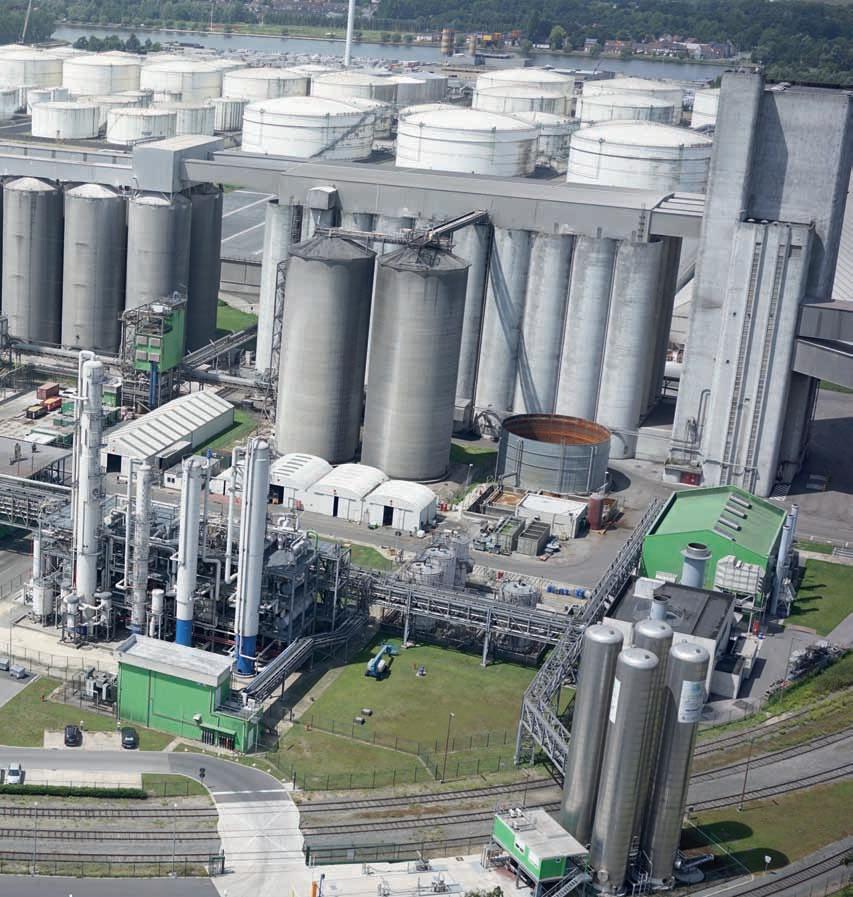
Alco Bio Fuel (ABF) is still a young company. It started producing bio-ethanol at its plant near the Rodenhuize dock in Ghent, the Belgian part of North Sea Port, in July 2008. “Back then, biofuels were an upcoming industry and we were exploring new territory on the interface between the chemical and agricultural sector”, recalls Mr Vercruysse. He was part of the team of engineers overseeing the construction of the new factory. He stayed on, moving up to the position of plant manager, a function he will now leave to become Director Technology Quality & Environment for the production facilities of Alcogroup, ABF’s main shareholder. Just twelve years after the start, Alco Bio Fuel has already covered quite some ground. Its initial production capacity of about 150,000m³ of renewable ethanol has gone up to 260,000m³, equivalent to roughly 260l million of this biofuel that can be blended with gasoline. “We now exceed the design capacity of our plant. This is mainly the result of a continuous optimisation by eliminating bottlenecks in the many stages
Photo courtesy of Jean-Louis Vandevoorde.
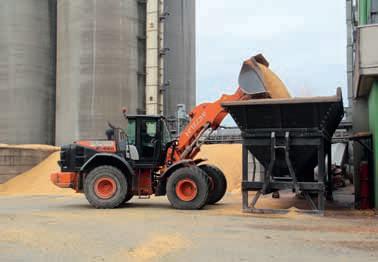
durinG the hArvest period ALco Bio FueL ALso Feeds nondried corn into its production process.
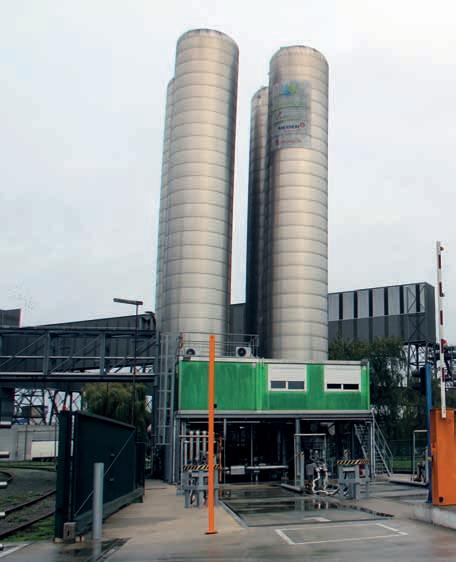
in our production process. We haven’t seen the end of this effort yet, even if all the low hanging fruit has been picked and every new progress is harder to achieve. But for us engineers, limitations are there to be overcome.”
Strategic port location Along the way, the multigrain installation which Alco Bio Fuel constructed at a cost of EUR 100 million fully switched from wheat and combinations of grains to corn as raw material for its bio-ethanol. The plant yearly consumes about 600,000t of corn, which is mainly imported from Black Sea countries, like Ukraine, or France. About one tenth of that volume comes from Belgian suppliers, a share which ABF would like to increase. Since the corn is brought in by seagoing ships or inland navigation vessels, being located in a port is a major advantage in terms of logistics. “This is even more so in Ghent, since we are part of the biocluster at Rodenhuize where several companies can interact using only conveyor belts and pipelines to exchange their flows. Incoming, our corn can be delivered and stored next door at grain stevedoring company Euro-Silo, which can also handle the outgoing 170,000t of protein-rich feedstock known as DDGS that we produce along with our ethanol and corn oil. The bio-ethanol can be directly transferred to tank terminal operator Oiltanking for storage and distribution. This proximity of major service providers helps us to reduce our ecological footprint.”
Sustainability drive Becoming greener always ranks very high on Alco Bio Fuel’s agenda, clarifies the plant manager. “Sustainability is at the very core of our business and takes on many forms. Our DDGS, for instance, replaces genetically modified soya that is imported from the USA or South America. During the harvest period we also use non-dried corn, hereby avoiding CO2 emissions linked to drying. Through a co-generation unit we cover our own needs in steam, and we produce excess electricity that is injected into the grid and can supply about 8,000 households. We were the very first biorefinery to receive the ISCC (International Sustainability and Carbon Certification) Proof of Sustainability certificate, as we comply with the very high standards that this scheme puts forward for the transition to a circular economy and bioeconomy. And we make top-grade bio-ethanol that now achieves CO2 emissions reductions of over 90% (up from 50% in 2008) when compared to the CO2 emissions of gasoline.”
Photo courtesy of Jean-Louis Vandevoorde.
Photo courtesy of Jean-Louis Vandevoorde.

As director technoLoGy QuALity & environment For ALcoGroup’s production pLAnts, mr vercruysse wiLL heLp to deFine the roAd to the Future For ALco Bio FueL.
A new milestone in making ABF ever more sustainable was reached in 2016, when the joint venture Green CO2 started purifying and liquifying up to 100,000t of carbon dioxide generated during the production process for re-use in the food and beverage industry (for creating the refreshing bubbles in soft drinks, e.g.), water recycling, cold chain logistics, and greenhouse horticulture or as a chemical raw material. At the time, Alco Bio Fuel stated that to obtain the same reduction in CO2 emissions would require a surface area of 2m2 million of solar panels. CO2
A messer truck LoAdinG co2. the storAGe unit wiLL Be expAnded with A FiFth tAnk.
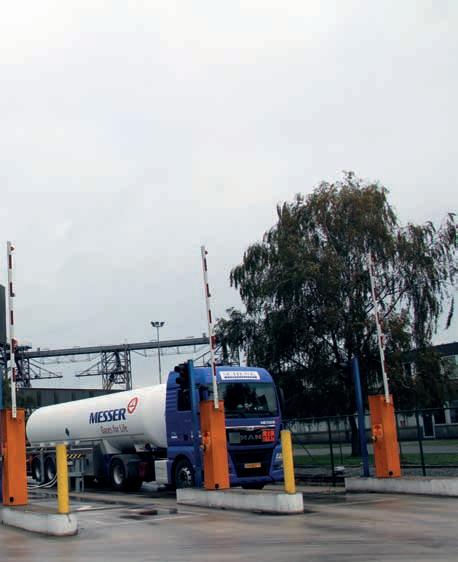
We want to further develop our biorefinery and expand our product portfolio. This might imply that we will be moving away from bio-ethanol.
hence became another item in ABF’s product range. For this project, Alco Bio Fuel joined forces on a 50/50 basis with Green CO2, in which two specialists in industrial gasses, Messer Benelux, and IJsfabriek Strombeek collaborate. Together they invested EUR 15 million in the new facility, which comprises four 30m high and 3.5m wide storage tanks. Each tank holds 300,000l of liquid CO2 that can be kept at a temperature of minus 20°C and a pressure of 20 bar.
New CO2 recovery unit The same partners recently decided to expand Green CO2 with a second carbon dioxide recovery unit. It will require an additional investment of EUR 10 million. The new installation will be up and running in the spring of 2022 and will bring the annual capture and re-use of green CO2 – and thus the reduction in emissions – to 160,000t, a plus of 60%. “This is equivalent to taking 117,000 cars off the road in Belgium”, the company stated when announcing the new project. The new recovery unit will be similar to the first one, further enhancing the plant’s reliability. A fifth storage tank will be added to the existing ones, the aim being to accelerate the rotation of the stored volumes. “Due to the low temperature and high pressure required, CO2 storage is not cheap.” Teaming up with players with a strong expertise in their own field is not new to ABF. The company itself is an alliance of three Belgian companies: Alcogroup (51%), a worldwide ethanol trading, distribution, and storage group, and one of the biggest producers and distributors of ethanol for fuel in Europe, Groep Vanden Avenne/Vandema (29%), a European specialist in agricultural raw materials, and Arvesta/Wal.Agri (20%), a major player in agriculture and horticulture products and services in Belgium. This brings together expertise in ethanol technology and upstream and downstream markets. “It is no use having the most efficient plant if you do not have the commercial knowhow to make it work in a profitable way or if you do not know where to get your raw materials at the best price or how to sell your different end products”, comments Mr Vercruysse.
New roads to the future
The new CO2 recovery unit is just another station on a longer journey, he underlines. “Our goal is to be climate-neutral and CO2 negative by 2030. This also means that we will have to deal with the fossil CO2 that we are still producing in our power generation. This is not an easy challenge to tackle, and the technology for doing so is still relatively expensive. We are looking into this matter. It is one of the reasons why we joined the North-CCU-Hub within North Sea Port. What we do and aim for fits perfectly well within their ambitions, as it does within the port’s global strategic objectives.” “We also want to further develop our biorefinery and expand our product portfolio. Glucose for bio-plastics, purer protein feed for fish farms, higher grade ethanol for industry, pharmacy and cosmetics are options that we are investigating. We even produced disinfection alcohol during the first weeks of the COVID-19 crisis, which shows the quality of our ethanol. Once more, we learned a few things about the ample possibilities that our refinery offers”, explains Mr Vercruysse. In his new position as Director Technology Quality & Environment, it will be his task to look into the potential of new products for Alco Bio Fuel in Ghent and for Alco Energy Rotterdam, which Alcogroup, Vanden Avenne and Vandema took over in 2016 and which is the largest facility of its kind in Europe. “The question is which products will we be making in five years? This might imply that we will be moving away from bio-ethanol, which is now our biggest money-maker. Ethanol still is the most efficient and competitive product for decarbonising the transport sector in the short term. But it is a market that mainly depends on regulation. More generally, the future will bring a mix of fuels and electric cars will become ever more present This will not happen overnight and we will remain one of the few bio-ethanol plants in Europe, but we must prepare for what comes next.” Alco Bio Fuel is ready to invest to make that happen. “By 2025 we might be spending around EUR 50 million on our own transformation. We are a profitable company and have the financial means to innovate. The important thing is to make the right choice – also an economically viable one – between the many technologies that can be developed but have not yet reached full maturity. One thing is sure though. We want to remain a front-runner on the way to a circular and biobased future. That’s why we now call ourselves Sustainable Pioneers”, concludes Mr Vercruysse.




